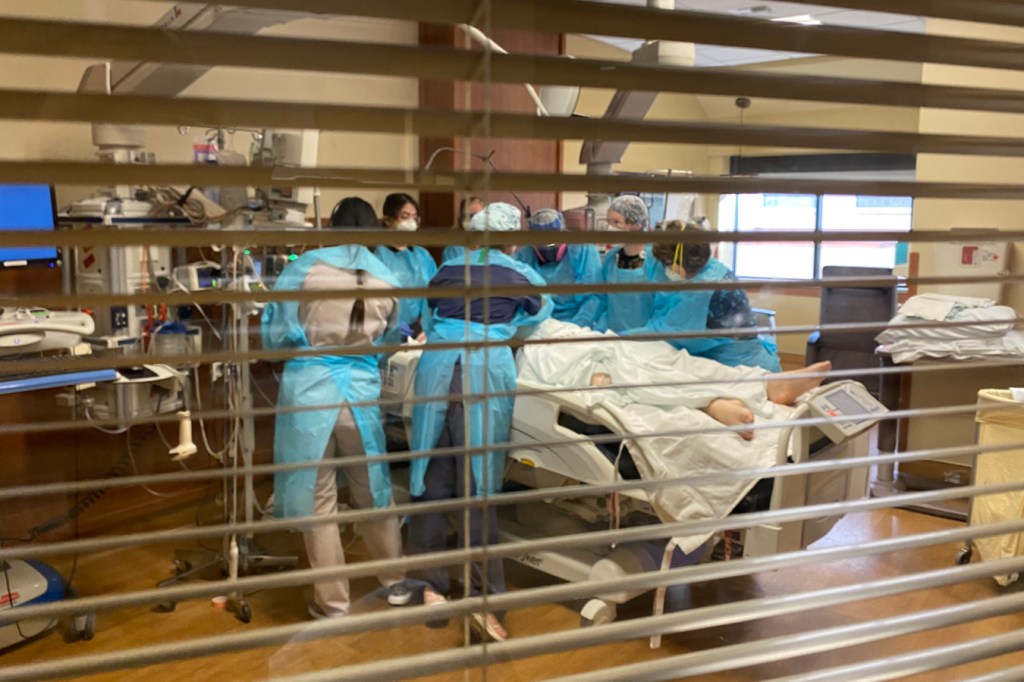— But how well will the results from China translate to Western populations?
by
Mike Bassett, Staff Writer, MedPage Today
February 16, 2024
Adding tislelizumab to neoadjuvant chemotherapy followed by adjuvant use of the investigational PD-1 inhibitor improved event-free survival (EFS) in resectable non-small cell lung cancer (NSCLC), a phase III trial from China showed.
While median EFS was not reached in either arm, EFS significantly improved with tislelizumab over 22 months follow-up (HR 0.56, 95% CI 0.40-0.79, P=0.0003). Landmark analyses for EFS favored the investigational arm at both 12 and 24 months:
- 12 months: 80% vs 68.1% with placebo
- 24 months: 68.3% vs 51.8%
Regarding the secondary endpoint of overall survival (OS), there was a trend in favor of tislelizumab (HR 0.62, 95% CI 0.39-0.98, P=0.0193). Twelve- and 24-month OS rates with the study drug reached 94.5% and 88.6%, respectively, as compared with 90.9% and 79.4% with placebo, reported Dongsheng Yue, MD, of Tianjin Medical University Cancer Institute and Hospital in China, during a European Society for Medical Oncology (ESMO) Virtual Plenary.
The neoadjuvant combination also significantly improved major pathological response (56.2% vs 15.0% with placebo) — the RATIONALE-315 trial’s second primary endpoint — and pathological complete response (40.7% vs 5.7%).
“This data supports the use of perioperative tislelizumab plus neoadjuvant chemotherapy for patients with resectable stage II-IIA non-small cell lung cancer,” Yue said.
ESMO discussant Luis Paz-Ares, MD, PhD, of the Hospital Universitario 12 de Octubre in Madrid, pointed out that the results in RATIONALE-315 appeared similar to other trials evaluating perioperative immunotherapy in NSCLC, such as the KEYNOTE-671 trial, which led to FDA approval of pembrolizumab (Keytruda) for use in combination with platinum-based chemotherapy in the perioperative treatment of resectable NSCLC.
At the same time, Paz-Ares observed there are issues related to RATIONALE-315 that need to be clarified, such as how well tislelizumab will do with non-Asian patients, considering that all of participants in the study were Chinese. In several other studies evaluating tislelizumab, he noted, the efficacy results among the entire study populations were comparable to those of the smaller subgroups of patients from Western countries.
“So that provides us with a little more confidence that … the data should be reproducible in Western populations,” he said.
Still, in addressing the question of whether tislelizumab should be approved by Western regulatory agencies in the NSCLC perioperative setting, Paz-Ares said more data would be desirable.
He suggested that a phase II trial in the perioperative setting testing tislelizumab plus chemotherapy versus pembrolizumab plus chemotherapy in a control arm for the endpoint of complete pathological response “would provide us with enough confidence to approve the drug” for this indication.
The RATIONALE-315 trial enrolled 453 patients with treatment-naive, resectable, stage II-IIIA NSCLC who were eligible for platinum-doublet chemotherapy and who had no known EGFR mutations or ALK gene translocations. They were randomized to neoadjuvant tislelizumab plus chemotherapy (three to four cycles) followed by adjuvant tislelizumab (eight cycles) after surgery, or to neoadjuvant chemotherapy plus placebo followed by placebo in the adjuvant setting.
Patients had a median age of 62-63 years, and over 80% in each arm were current or former smokers. About 80% of the study population had squamous cell histology, and 41% had stage II cancer.
Regarding safety, nearly all patients in both arms experienced at least one treatment-related adverse event (TRAE), with 72.1% and 15.5% of patients in the tislelizumab experiencing grade ≥3 TRAEs and serious TRAEs, respectively, compared with 66.4% and 8% of patients in the placebo arm.
TRAEs leading to treatment discontinuation occurred in 12.8% of patients in the tislelizumab arm and 9.3% in the placebo arm.
![author['full_name']](data:image/svg+xml;base64,PHN2ZyB4bWxucz0iaHR0cDovL3d3dy53My5vcmcvMjAwMC9zdmciIHdpZHRoPSI1MCIgaGVpZ2h0PSI1MCIgdmlld0JveD0iMCAwIDUwIDUwIj48cmVjdCB3aWR0aD0iMTAwJSIgaGVpZ2h0PSIxMDAlIiBzdHlsZT0iZmlsbDojY2ZkNGRiO2ZpbGwtb3BhY2l0eTogMC4xOyIvPjwvc3ZnPg==)
Mike Bassett is a staff writer focusing on oncology and hematology. He is based in Massachusetts.
Disclosures
The study was funded by BeiGene.
Yue had no disclosures.
Paz-Ares reported multiple relationships with industry.
Primary Source
European Society for Medical Oncology
Source Reference: Yue D, et al “RATIONALE-315: Event-free survival (EFS) and overall survival (OS) of neoadjuvant tislelizumab (TIS) plus chemotherapy (CT) with adjuvant TIS in resectable non-small cell lung cancer” ESMO 2024; VP1-2024.
Note: This article have been indexed to our site. We do not claim legitimacy, ownership or copyright of any of the content above. To see the article at original source Click Here



![author['full_name']](https://clf1.medpagetoday.com/media/images/author/MikeBassett_188.jpg)










